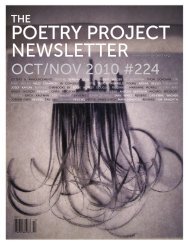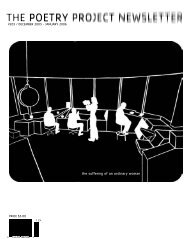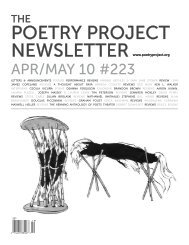Download PDF - The Poetry Project
Download PDF - The Poetry Project
Download PDF - The Poetry Project
Create successful ePaper yourself
Turn your PDF publications into a flip-book with our unique Google optimized e-Paper software.
THE POETRY PROJECT NEWSLETTER<br />
25<br />
BOOK REVIEWS<br />
Wilson’s hammering out the particular, categorical,<br />
fixed noun, “a black” from the diffusive and general<br />
adjectival form in “a black hole” is nothing<br />
short of astonishing—and in effect answers the<br />
original question as the fog of abstract visuals<br />
suddenly breaks to suggest a human being.<br />
How is that possible But blackness in those<br />
lines defines not only an object/subject as it<br />
exists in space and (narrative-)time, but space<br />
itself. I’m left considering how race (blackness)<br />
extends beyond the bodies to which it is meant<br />
to adhere, where the language of recognition is<br />
not taken for granted, but undermined, made to<br />
seem distant and invasive, or to bleed beyond<br />
its boundaries.<br />
For this reason, I’m intrigued by the insectual<br />
and the creaturely that stalk the pages, given<br />
that the animalistic, throughout the history of<br />
racial discourse, has been used to dehumanize.<br />
But Wilson’s human-nonhuman encounters<br />
are evocative and complex. <strong>The</strong> common fly,<br />
aphids, worms are all understated though recurring<br />
objects throughout the book, lending a<br />
sense of rot, parasitism, and decomposition to<br />
the material bodies on display here, as though<br />
to remind us that what is permanent about<br />
identity is not our bodies, despite the body being<br />
the object of identification. Sometimes the<br />
speaker serves as host, “Something crawled /<br />
up me and died”, and “the bed / bugs feed /<br />
on a hollow leg”. Other times the speaker exacts<br />
violence upon these other life forms, as in<br />
the poem that details the ambiguously intended<br />
torturing of a leaf-bug. <strong>The</strong> book’s cover images,<br />
details of a nineteenth-century illustration of a<br />
stingray, similarly frame the poems with this<br />
same inhuman sentience, a study of the life<br />
that defines our humanness in distinction. <strong>The</strong><br />
stingray’s memorable appearance in the poem<br />
“Dream in Fair” is as striking as it is humorous:<br />
Left Eye Lopes is angular in the dream; alive,<br />
she is in a silver crop-top.<br />
She’s a junkie who shows up under the bridge<br />
and asks, “Are you ___”<br />
I can’t remember the name, only that I’m looking<br />
down into Woodard’s face.<br />
Another young black woman pulls out a gun<br />
that shoots out a dart<br />
full of tranq that flies through the air at her chest.<br />
Steve Irwin was killed by a stingray barb to the<br />
heart today.<br />
He was 44. On the internet, it was black, and he<br />
was under the sea.<br />
<strong>The</strong> brilliance of this sequence is that you end<br />
up performing, as a reader, the same failures<br />
of recognition as the dreamer above. Does the<br />
shooter stick her own chest with the dart And<br />
what was black, exactly, on the internet And<br />
am I meant to read Left Eye and the Crocodile<br />
Hunter as contrasting racial types here, lodged<br />
in the framing devices of pop-cultural media<br />
narratives But how do I relate this to the figure<br />
of Wilson’s mother, who appears as actress Alfre<br />
Woodard above And is the dream a critical<br />
apparatus here or merely an escape hatch with<br />
which to direct desires of misrecognition In the<br />
face of this ambiguity, Wilson gives us the neologism<br />
“WRECKEDCOGNITION” as a form of<br />
“recognizing failure, the failed, the exhausted.” If<br />
“race is all made up” as the speaker glibly states<br />
in the epistolary section, “Vergelioian Space”,<br />
then it requires something like “wreckedcognition”<br />
to see it as a failed or exhausted project<br />
of our own making. In this, possibly, we might<br />
identify something like a utopic desire of the<br />
black object at stake in the book. Not a defamiliarization,<br />
but a disorienting (“no north star”) of<br />
the way we relate our bodies. And despite the<br />
book’s brimming with loss and violence (“your<br />
block will get knocked”), a call for a new sensibility<br />
rooted in density and difference: “Feel.<br />
Unconscious. Un-Make. Sense, and line it as<br />
you wish—repel, rebel.”<br />
Brad Flis lives in Detroit.<br />
Duties of an English Foreign Secretary<br />
Macgregor Card<br />
(Fence Books, 2009)<br />
To Light Out<br />
Karen Weiser<br />
(Ugly Duckling Presse, 2010)<br />
review by rodney koeneke<br />
Karen Weiser and Macgregor Card describe<br />
their books as “companion volumes,” sharing<br />
words and lines drawn from nearly a decade’s<br />
worth of weekly collaborations. It’s an apt<br />
phrase for two collections that investigate the<br />
varieties of human connection so intensely; it<br />
also invites a reading of each book in the light of<br />
the other that may be unique in contemporary<br />
poetry.<br />
I thought reviewing them in tandem would be<br />
like pushing the leaves of a table back together, or<br />
joining the split halves of a symbolon, the broken<br />
message that completes itself when its bearers<br />
reunite. It’s true that the cross-book echoes—<br />
“incrementalized doubt,” “vatic underfauna,” “the<br />
robin in the venison,” and several others—let<br />
you in on the fun of a longstanding creative<br />
friendship. It’s amusing and gratifying, the way<br />
filling in a crossword or snapping together two<br />
puzzle pieces can be, to spot the parallels and<br />
imagine the writing sessions as the lines passed<br />
back and forth. But the language in common<br />
also throws light on their points of departure.<br />
Reading them side-by-side, it’s the divisions<br />
that struck me as much as the joins.<br />
One of my favorite poems in Card’s Duties of<br />
an English Foreign Secretary is “Contempt,” a<br />
cento made up of famous last words. <strong>The</strong>re’s<br />
something inherently stagy about dying lines;<br />
the speaker and the listener (what good are<br />
last lines without an audience) share an awareness<br />
of the “big finish” waiting in the wings that<br />
charges whatever’s said with disproportionate<br />
drama. Funny, grand, absurd, or banal, any<br />
phrase in that context takes on the weight of<br />
an address to the footlights, and Card’s cento,<br />
like the poems that follow, revels in cataloging<br />
its possible tones (“it was a mistake,” “<strong>The</strong> gas<br />
is low,” “Mozart! Mozart!,” “Now comes the<br />
mystery,” “Put out the light”, etc.). <strong>The</strong> poem<br />
operates in a way that’s characteristic of Card’s<br />
approach throughout: dramatic, wittily selfaware,<br />
often enigmatic declarations that gain<br />
their emotional power by keeping the drama<br />
that provoked them just offstage.<br />
Take, for instance, another favorite:<br />
So full of longing, the day was mine warning<br />
to sleep hard and never, the earth pied by trees<br />
full of people, tradesmen, police and students<br />
friendly from ear to glare. She was a beautiful<br />
chauffeur who bent a horseshoe into wealth,<br />
hand against my heart, now I sing a foolish<br />
song, like a crossguard in a part of town, night<br />
came and summer stuck it in smoke, I mean,<br />
tonight I have work and I have memories, basically<br />
a ton.<br />
A clear, even generic emotional axis runs<br />
through the poem—“longing,” “heart,” “song,”<br />
“memories”—but the speaker seems equally<br />
drawn to the mise-en-scéne of his own dramatic<br />
situation. He notes the “earth pied by<br />
trees”, the summer night, the grinning extras,<br />
and the dress-up roles of chauffeur and crossguard—an<br />
accident waiting to happen—while<br />
keeping the exact nature of the “longing” and<br />
“memories” just out of view. What work Which<br />
part of town <strong>The</strong> poem creates its effect by not<br />
letting us know; like with all the best ballads, the<br />
information’s in the telling indirections.
















